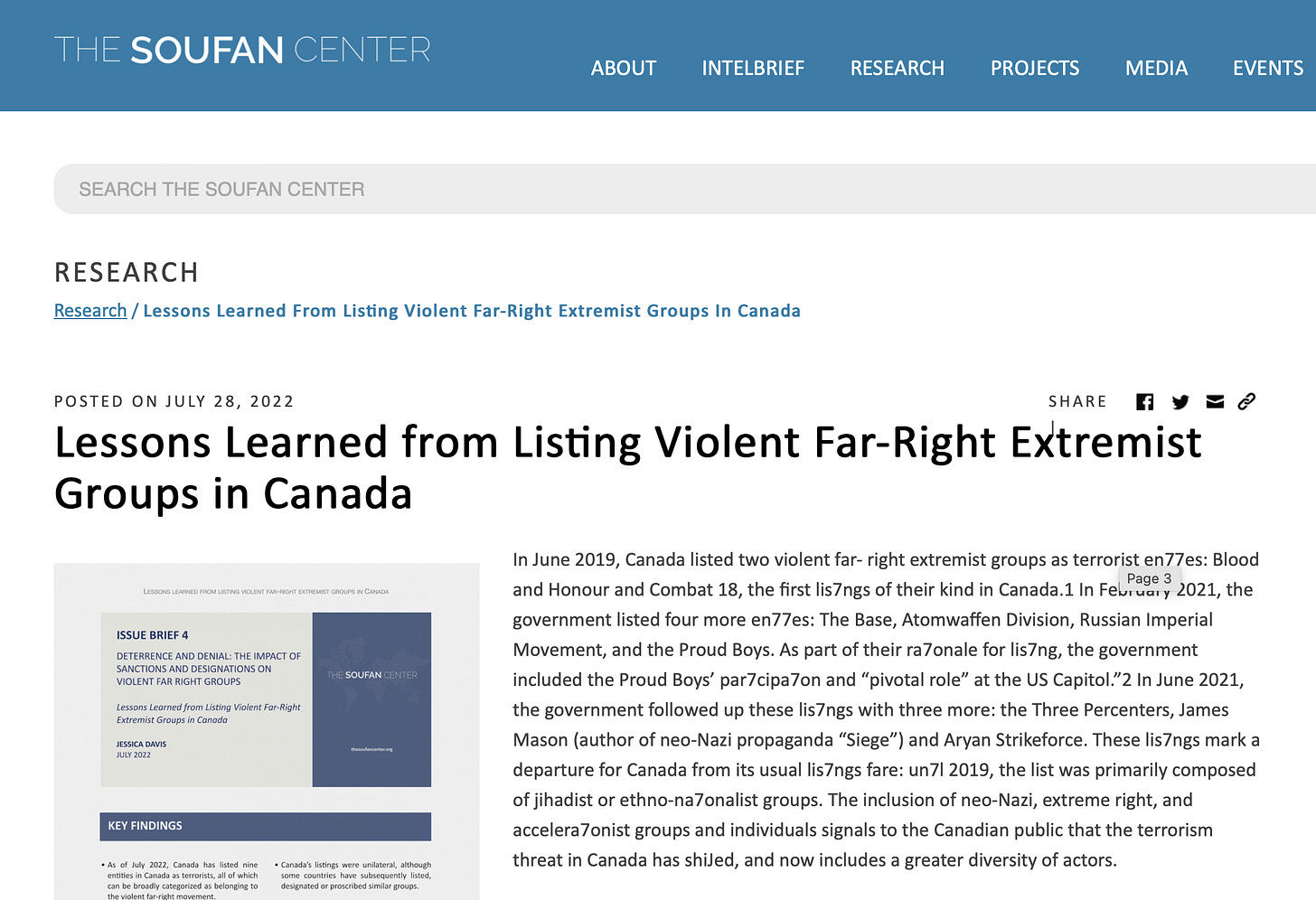Lessons Learned from Listing Violent Far-Right Extremist Groups in Canada
Issue Brief for The Soufan Center
In today’s newsletter, I’m sharing a report published by The Soufan Center on lessons learned from listing violent far-right extremist groups in Canada. This paper is part of a broader project you can access here. The Soufan Center team and I have been working on this project for the last few months. We’ve had the pleasure of speaking to many people for this report, including round-tables in Washington, D.C. and virtually. We’ve had some great input, and it’s my pleasure to share the final reports. Be sure to read all the papers — they are mutually reinforcing and share plenty of common themes and ideas!
In true bottom-line up front style, here are my recommendations:
1. Canada should work with partner countries to coordinate the designation or listing of entities. While unilateral listings have some desired outcomes (such as signaling) that will be of interest to policy makers, they should work with partner countries to coordinate proscription for greater impact. This will help prevent groups, movements, individuals, and entities from engaging in jurisdictional arbitrage, essentially taking advantage of states with weaker or non-existent proscriptions.1
2. Canada should share information on Canadian listed entities with partner states, and in particular the United States, to facilitate the designation process. Canada should be open to supporting the United States, should it choose to designate foreign branches of US-domiciled terrorist entities, such as the “Canadian Proud Boys” or the “Canadian Three Percenters”.2
3. Canada should increase transparency around how it chooses groups for listing, how it prioritizes them within its listing process, and share more information in the public designation. These improvements would help reduce the appearance of politicization of these decisions and enhance the signaling effects of the listings regime.
4. All states should establish metrics to assess the implementation and impact of sanctions or designations and encourage international sanctions regimes to also establish these metrics.3
5. When financial entities in Canada continue to provide financial services to listed terrorist entities, or websites providing services to terrorist entities, Canadian law enforcement should liaise with the companies in question, consider terrorist financing criminal charges, and if or when those services are disrupted by these initiatives, issue a public statement to encourage greater adoption and compliance with the law.
You can also access the webinar from yesterday’s event here if you’d like to listen to the team discuss the reports. And if you want to learn more about the effects of listings in Canada, you can read this newsletter:
See Recommendation 3 in Mollie Saltskog, “Deterrence and Denial: Trends in Violent Far-Right Extremism,” The Soufan Center, 2022, https://thesoufancenter.org/projects/deterrence-and-denial-the-impact-of-sanctions-and-designations-on-violent-far-right-groups/; and Recommendation 3 in Colin P. Clarke, “Deterrence and Denial: Lessons Learned from the 1267 Sanctions Regime against Al-Qaeda and Islamic State in Iraq and Syria (ISIS),” The Soufan Center, 2022, https://thesoufancenter.org/projects/deterrence-and-denial-the-impact-of-sanctions-and-designations-on-violent-far-right-groups/
See Recommendation 2 in Jason M. Blazakis and Megan Rennebaum, “Deterrence and Denial: Comparing Violent Far-Right Terrorist Designations among Five Eyes Countries,” The Soufan Center, 2022, https://thesoufancenter.org/projects/deterrence-and-denial-the-impact-of-sanctions-and-designations-on-violent-far-right-groups/.
See Recommendation 2 in Colin P. Clarke, “Deterrence and Denial: Lessons Learned from the 1267 Sanctions Regime against Al-Qaeda and Islamic State in Iraq and Syria (ISIS),” The Soufan Center, 2022, https://thesoufancenter.org/projects/deterrence-and-denial-the-impact-of-sanctions-and-designations-on-violent-far-right-groups/.




